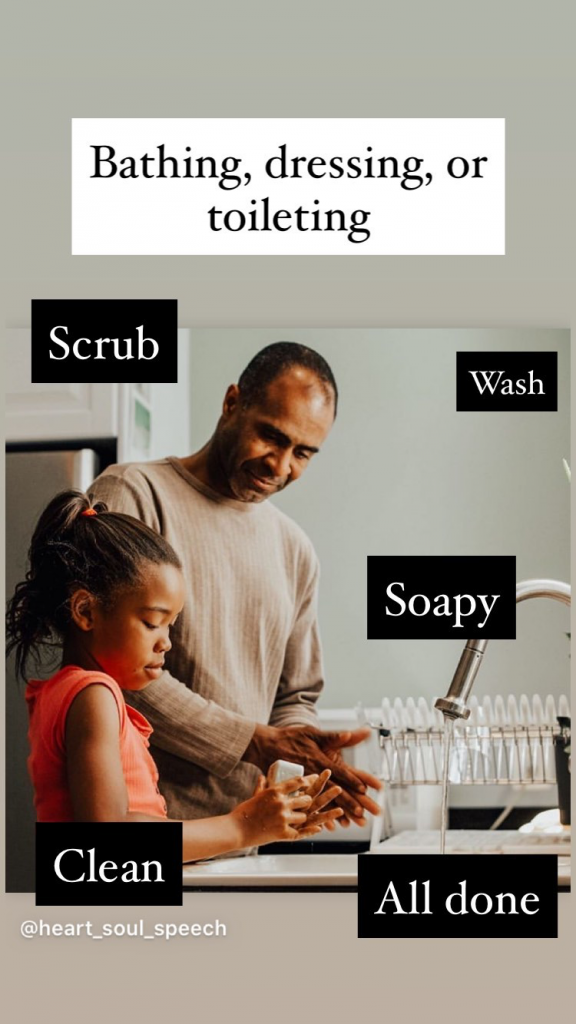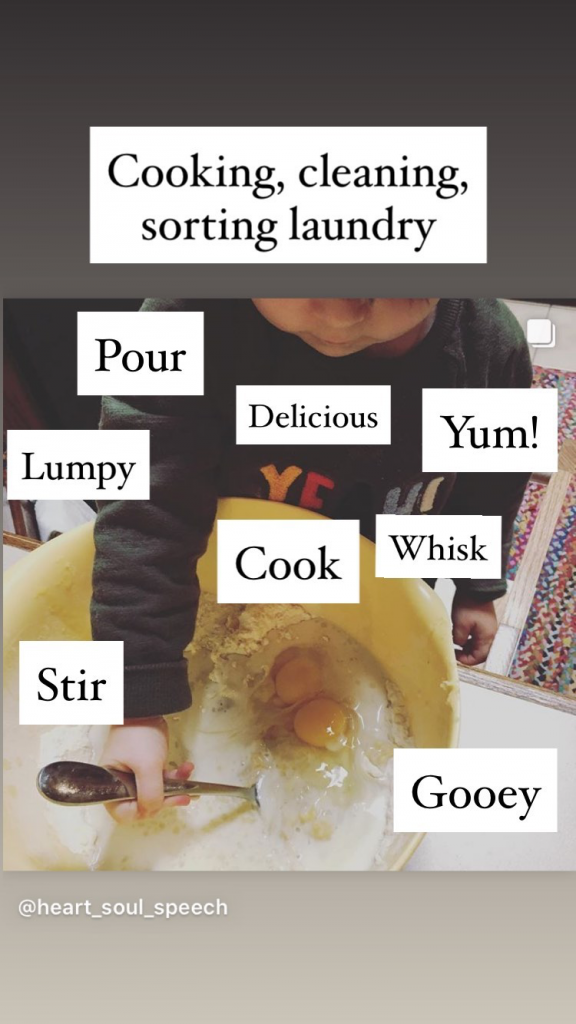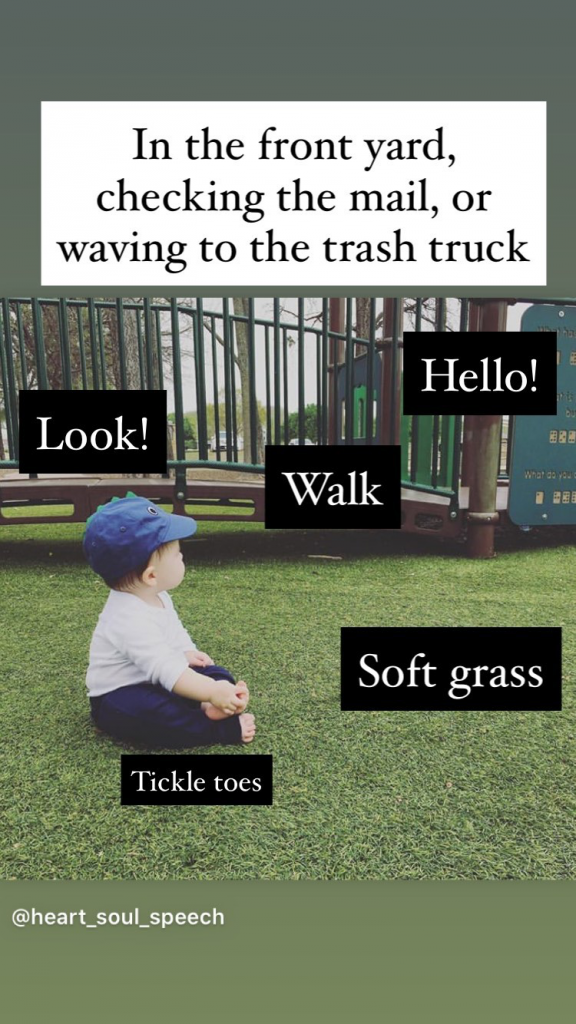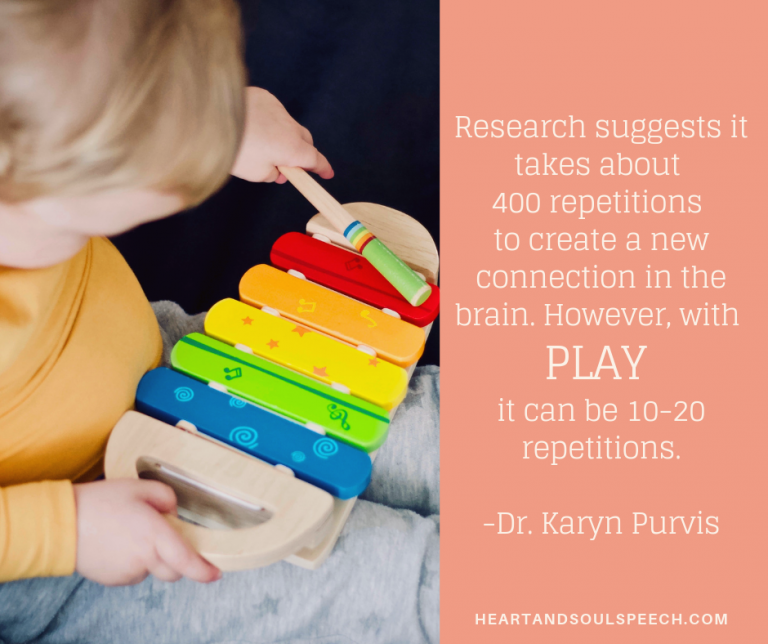
If you’re wondering how to support your child’s language development, I have a secret for you:
You don’t need more toys.
You don’t need a fancy playroom.
Nope, not even more hours in the day.
You just need language learning in real life! In everything we do, there are opportunities for language and learning. Language can happen anywhere, with anyone, using anything!



Language learning in real life is how I describe the interactions between parents and children during play and routines at home each day. Children thrive on simple, yet meaningful interactions with others in a supportive environment.
Parents can better support their child’s communication skills by learning two skills:
- How to integrate meaningful interactions during daily routines
- How to use what is commonly found in a typical home to target language playfully and purposefully
These are concepts derived from Family-Centered Routine-Based Intervention and parent coaching models. Both are well-established and evidence-based approaches professionals use in therapy with parents and caregivers.
In therapy or research, you may hear this also described as routine-based intervention and play-based intervention. It is difficult to distinguish between the two skills. Play can occur in all daily routines and repetitive routine can be found in play. However when these two skills are used in a child’s natural environment, it can be extremely effective in supporting a child’s development.
Routine-Based Learning
Daily routines are defined by McWilliam (2010) as “naturally occurring activities happening with some regularity, including caregiving events and simply hanging-out times (pg 69). This can include dressing, eating, bathing, shopping, cleaning, laundry, etc. Other important events, such as holidays, vacations, or other meetings may not happen daily, but are also included in routines. All family activities offer opportunities for interaction and potential for learning (Crawford & Weber, 2014).
Therapy is not therapeutic if it cannot be transferred to a child’s natural environment. This means the child needs to be successful at home and in the community. Daily routines happen frequently, sometimes several times a day, and therefore functional language targets are naturally occurring. Using this context does not add additional expectations or responsibilities for practice.
Research shows routine-based intervention is effective in increasing a variety of vocabulary words, frequency of interaction, and progress on goals. Parents who use these strategies report feeling less stressed, more confident in their parenting skills, and observed improved social communication from their child (Ibañez et al, 2018).
Play-Based Learning
Play-based learning is the practice of guided interactive play to support socio-emotional, physical, language, and cognitive development (What Works Clearinghouse, 2012). Learning through play is proven to be extremely effective for language acquisition. Research suggests it takes about 400 repetitions to create a new connection in the brain. However, with play, it can be done in 10-20 repetitions! (Dr. Karyn Purvis) Additionally, prerequisite skills for language such as imitation, turn-taking, and attention, can be targeted in play.
During play, children use all of their senses to explore their environment. They connect what they already know with new knowledge. Children develop problem-solving skills, social skills, and other executive function skills required for later independence.
Play doesn’t mean just toys. It can be as simple as singing songs in the car or hopscotch in the front yard. My toddler can jump off the couch onto pillows for hours. It’s fun!
Although play can look different across families, it continues to be a powerful and purposeful way to help children. When caregivers follow a child’s lead in play, we can observe their development and offer support more intentionally.

You – Parents – Can Do This!
When parents and caregivers are empowered to use these strategies, they can be just as effective as therapists (Roberts et al., 2019; Roberts & Kaiser, 2011). Parents are the experts on their child. They know what is realistic and important to their family. When caregivers have the information and guidance they need, families are better able to make informed decisions about caregiving and supporting child development.
When it comes to child development, your routines are important and what you have in your home is valuable. What you have is already perfect for learning. It doesn’t matter if you’re just talking about the never-ending laundry or playing with sock puppets – it’s an opportunity for language learning in real life!
References
Crawford, M.J., and Weber, B. (2014). ‘Early Intervention Every Day: Embedding Activities in Daily Routines for Young Children and Their Families’. Paul H Brookes Publishing Co., Baltimore, MD.
Ibañez, L.V., Kobak, K., Swanson, A., Wallace, L., Warren, Z., & Stone, W.L. (2018). ‘Enhancing Interactions During Daily Routines: A Randomized Controlled Trial of a Web‐based Tutorial for Parents of Young Children with ASD’. The International Society for Autism Research.
McWilliam, R.A. (2010). “Routines-Based Early Intervention: Supporting Young Children and Their Families”Paul H Brookes Publishing Co., Baltimore, MD.
Roberts, M.Y., and Kaiser, A.P. (2011). ‘The Effectiveness of Parent-Implemented Language Interventions: A Meta-Analysis’. American Journal of Speech-Language Pathology, Vol. 20, pp.180–199.
Roberts, M.Y., Curtis, P.R., Sone, B.J., & Hampton, L.H. (2019). ‘Association of Parent Training with
Child Language Development: A Systematic Review and Meta-analysis’. JAMA Pediatrics.
What Works Clearinghouse (WWC). (2012). “Play-based interventions.”
Related Articles:
Top 20 Everyday Non-Toys for Language Development

Thanks so much!